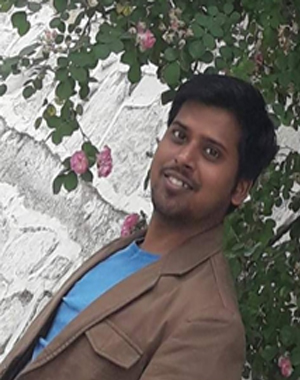| |
|
|

Dr. Nitin Keshari
Dr. Nitin Keshari has done his Ph.D. and Postdoc in Biotechnology. He has enjoyed being the part of many successful productive teams and institutions for international scientific programs as well as delivered many overseas lectures. He guided many students how to learn smartly and achieve academic excellence through his proper guidance. His teaching methodology centers around the emphasis on learning key concepts through strategic use of keywords. During lectures, he employs dynamic tools such as PowerPoint presentations, visuals, and informative figures to enhance the learning experience and make complex concepts engaging. This approach not only facilitates better understanding but also ensures that students find the subject matter interesting and memorable. He quickly assesses the needs of the students and is skilled in offering innovative solutions to address their challenges. He regularly demonstrates high levels of motivation and dedication while working well on his own initiatives. Besides teaching programs, he is involved in scientific research and published many international papers, filed patents and discovered many new species of cyanobacteria to contribute Science and human welfare.
His many publications, which are easily accessed online, provide enough documentation of his significant contributions to Science. A glimpse of his work includes:
1. Keshari et al. 2021. Colonization and survival of a stress tolerant cyanobacterium on a heritage monument of Santiniketan, India. International Biodeterioration & Biodegradation 164, 105294.
2. Keshari et al. 2019. Compatible solutes profiling and carbohydrate feedstock from diversified cyanobacteria. Algal Research 43, 101637.
3. Keshari et al. 2019. Microbial deterioration of heritage monuments in Santiniketan, West Bengal, India. Current Science. 116(5): 709-711.
4. Keshari et al. 2016. Schmidleinema santiniketanense sp. nov. (Fischerellaceae, Cyanobacteria/ Cyanoprokaryota) from a building facade in Santiniketan, India. Phytotaxa 283 (2): 181–187.
5. Keshari et al. 2016. Stigonema tagorum sp. nov. (Stigonemataceae, Cyanoprokaryota) from a stone monument of Santiniketan, West Bengal, India. Nelumbo, 58:152-156.
6. Keshari et al. 2015. Identification of cyanobacterial with overlapping morphological features through 16S rRNA gene sequencing. European Journal of Phycology, 50(4):395–399.
7. Keshari et al. 2014. Diversity of cyanobacteria on stone monuments and building facades of India and their phylogenetic analysis. International Biodeterioration & Biodegradation, 90:45–51.
8. Keshari et al. 2013. Characterization of cyanobacteria isolated from biofilms on stone monuments at Santiniketan, India. Biofouling, 29:525-536.
His involvement in a number of national and international conferences/symposiums demonstrates his dedication to remaining at the forefront of research activities:
1. “International Congress on Science and Technology for the Conservation of Cultural Heritage II” June 24-27, 2014, Seville, Spain.
2. “Symposium on biotechnology and stress biology of algae and cyanobacteria” 24th to 26th February 2014. Centre of Advance Study in Botany, Banaras Hindu University, Varanasi.
3. “Frontiers in Algology and Algal Biotechnology [NCFAAB]", 15th to 17th November 2013. Dept. of Biotechnology, Visva-Bharati (A Central University), Santiniketan.
4. “National symposium on Fundamental and Applied Phycology” 25th-26th, March 2013. Punjabi University Patiala, Punjab.
5. “National seminar on Micro and Macro Resources in Biomolecular Technology” 25th-26th, February 2013. Dept. of Biotechnology and Microbiology, University of North Bengal.
6. “100th Indian Science Congress” 3rd-7th January 2013. Calcutta University, Kolkata.
7. “International conference on Microbial world: recent innovations and future trends, 53rd Annual conference of Association of Microbiologists of India (AMI)” 22nd-25th November 2012. KIIT University, Bhubaneswar.
8. “International conference on microorganisms in Environmental Management and Biotechnology” July 1st-3rd, 2011. Brakatulla University, Bhopal.

DR. Priyanka JaIN
Dr. Priyanka Jain has done her Ph.D. in Life Sciences from Jawaharlal Nehru University (JNU), New Delhi, India. She continued her research as a postdoctoral fellow contributing to Science and many international teaching programs. After diving deep into research and teaching programs, she sets out to create a flexible overseas learning platform. She brings a distinguished expertise in international teaching and research experience, demonstrating a commitment to promote global understanding and academic excellence. With a wealth of knowledge gained from teaching in diverse platforms, Dr. Jain possesses the understanding of the complexities and opportunities within the field. Her educational innovations, informed by rigorous research, not only enhance student learning outcomes but also contribute to the advancement of educational practice on a global scale. Through her mentorship, collaboration with international institutions, Dr. Jain continues to make significant contributions to the promotion of educational environments worldwide.
Her few publications, which are easily accessed online, provide enough documentation of his significant contributions to Science. A glimpse of her work includes:
1. Jain et al. 2019. Modulation of azole sensitivity and filamentation by GPI15, encoding a subunit of the first GPI biosynthetic enzyme, in Candida albicans. Scientific Reports. 2019 June 11; 9: 8508.
2. Priyanka Jain. 2018. Ras signaling activates glycosylphosphatidylinositol (GPI) anchor biosynthesis via the GPI-N-acetylglucosaminyltransferase in Candida albicans. J. Biol. Chem. 2018 June 15, 293(31):12222-12238.
|
|
|
|
|